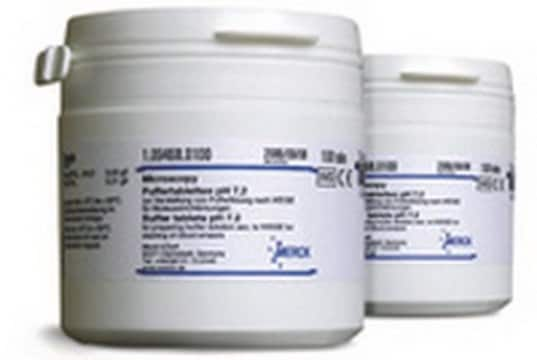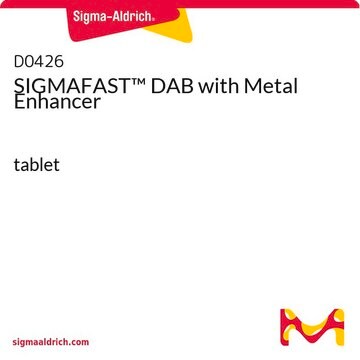D5637
3,3′-Diaminobenzidine tetrahydrochloride hydrate
≥96%
Synonym(s):
(1,1′-Biphenyl)-3,3′,4,4′-tetramine tetrahydrochloride dihydrate
About This Item
Recommended Products
Quality Level
Assay
≥96%
form
powder, crystals or chunks
technique(s)
titration: 96-104% (with NaOH)
color
white to light brown, and Faint Red and Faint Grey to Light Grey
mp
280 °C
solubility
H2O: 50 mg/mL
application(s)
diagnostic assay manufacturing
hematology
histology
storage temp.
−20°C
SMILES string
O.Cl.Cl.Cl.Cl.Nc1ccc(cc1N)-c2ccc(N)c(N)c2
InChI
1S/C12H14N4.4ClH.H2O/c13-9-3-1-7(5-11(9)15)8-2-4-10(14)12(16)6-8;;;;;/h1-6H,13-16H2;4*1H;1H2
InChI key
DXWSCXIZIHILNP-UHFFFAOYSA-N
Looking for similar products? Visit Product Comparison Guide
General description
Application
Biochem/physiol Actions
Signal Word
Danger
Hazard Statements
Precautionary Statements
Hazard Classifications
Acute Tox. 4 Oral - Carc. 1B - Eye Irrit. 2 - Muta. 2
Storage Class Code
6.1C - Combustible acute toxic Cat.3 / toxic compounds or compounds which causing chronic effects
WGK
WGK 3
Flash Point(F)
Not applicable
Flash Point(C)
Not applicable
Personal Protective Equipment
Certificates of Analysis (COA)
Search for Certificates of Analysis (COA) by entering the products Lot/Batch Number. Lot and Batch Numbers can be found on a product’s label following the words ‘Lot’ or ‘Batch’.
Already Own This Product?
Find documentation for the products that you have recently purchased in the Document Library.
Customers Also Viewed
Articles
NBT-BCIP substrate system aids in western blotting and immunohistological staining, producing a blue-purple insoluble end product.
Our team of scientists has experience in all areas of research including Life Science, Material Science, Chemical Synthesis, Chromatography, Analytical and many others.
Contact Technical Service










